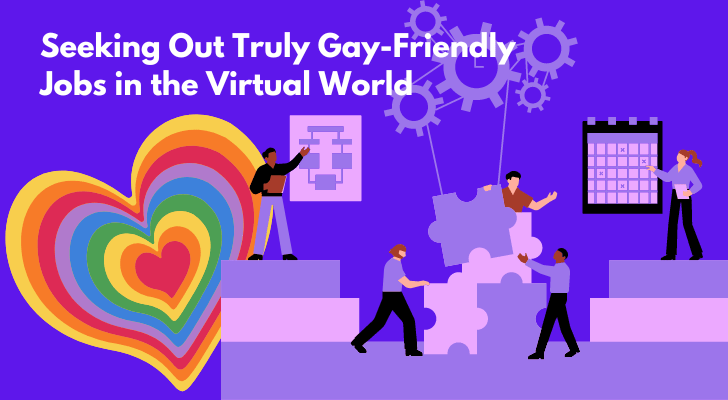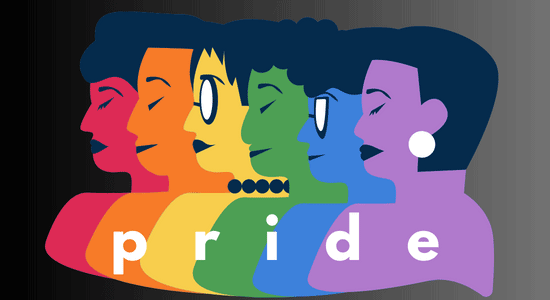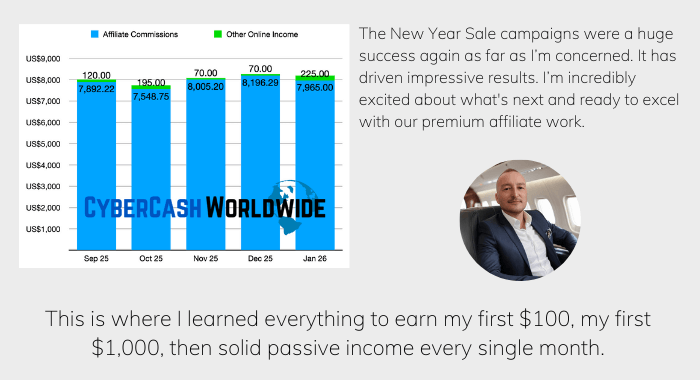The fight for LGBTQ+ rights and acceptance has come a long way, but unfortunately, discrimination still exists in the workplace, even online. As a member of the LGBTQ+ community, it's pretty hard to find out whether an employer values diversity and inclusivity before you consider applying for a job.
The good thing about working online is that there is no "he said, she said" - if someone makes a discriminatory comment against you, all you have to do is take a screenshot and take it further. But ideally, you want to work for an organization where no nasty homophobia exists.
With the rise of virtual work opportunities and Pride awareness around the world, there are more options than ever before for seeking out truly gay-friendly jobs. So let's find out how we can avoid homophobic employers online, what to consider when seeking out gay-friendly employers, running your own LGBTQ+ related business online and promoting LGBTQ+ products.

Did You Know?
- Increase in Remote Work Opportunities: Over 50% of companies globally offer remote work, broadening opportunities for inclusive employment.
- LGBTQ+ Representation in Tech: The tech industry, a major provider of virtual jobs, has seen a growing representation of LGBTQ+ employees, with companies like Google and Apple leading in inclusivity efforts.
- Importance of Inclusive Policies: 91% of Fortune 500 companies now have non-discrimination policies that include sexual orientation.
- Remote Work as an Equalizer: 70% of LGBTQ+ workers believe remote work provides a more comfortable environment to express their identity.
- Mental Health Benefits: LGBTQ+ employees working in inclusive environments report 25% lower stress levels and 35% improved mental health.
The Current State of the Gay-Friendly Job Market
Certainly, more companies prioritize diversity and inclusion in their hiring practices than ever before. Many corporations have implemented LGBTQ+ policies and benefits for their employees, such as same-sex partner health insurance coverage.
But when we look at local cultural differences, discrimination against the LGBTQ+ community still exists in many industries and regions around the world.
Hypothetically, rural areas may have a more conservative culture that may be less accepting of LGBTQ+ people. In some countries where being openly gay is illegal or socially taboo, finding a truly accepting employer can be an uphill battle.
Just because a company claims to be inclusive doesn't necessarily mean they follow through on those values. Check your potential employers' track records with regard to LGBTQ+ rights and acceptance.
Fortunately, virtual work opportunities have opened up new possibilities for members of the LGBTQ+ community seeking employment without geographical limitations. As remote work continues to grow in popularity post-pandemic, it may become easier for queers to find accepting workplaces regardless of location.
CyberCash Wonderland

"Brandon, you changed your job to what? A switchboard for... gay people? Why would you do that? Are you trying to meet someone new? Some...flamboyant hairdresser with a poodle? Brandon darling, we can work this out, just don't throw our love away for some phone-answering fantasy! You still love me, don't you? What do you mean, as a hag?"
Anti-Gay Countries and The Rise of Pride Awareness
In some parts of the world, being openly gay can still result in discrimination and even criminal charges. Anti-gay countries have laws that prohibit homosexuality, making it difficult for members of the LGBTQ+ community to live their lives freely. They are facing discrimination, persecution, and violence. Some of the most anti-gay countries include:
- In several countries in the Middle East, such as Saudi Arabia, Iran, and Yemen, where homosexuality is punishable by imprisonment, fines, and in some cases, even death.
- Some African countries, including Nigeria, Uganda, and Tanzania, have implemented strict anti-LGBTQ+ legislation, with penalties ranging from imprisonment to life sentences.
- In parts of the Caribbean, countries like Jamaica and Barbados have laws that criminalize consensual same-sex sexual activity.
- Russia: The homophobic government passed laws banning "homosexual propaganda" back in 2013 and promotes "traditional values." Russian society generally remains conservative and traditional, with many people holding negative attitudes towards the LGBTQ+ community.
Did You Know?
- Higher Job Satisfaction: Employees who feel their workplace is inclusive are nearly twice as likely to be satisfied with their job.
- Increased Productivity: Inclusive workplaces see a 22% increase in productivity among LGBTQ+ employees.
- Greater Retention Rates: Companies with inclusive cultures have 50% higher retention rates of LGBTQ+ employees.
- Rise of LGBTQ+ Networking Groups: Over 60% of virtual companies support or have LGBTQ+ networking groups.
- Preference for Inclusive Companies: 80% of LGBTQ+ people prefer to work for companies with clear inclusivity policies, even more so in virtual settings.
Despite the challenges, the LGBTQ+ community and allies have continued to advocate for equality and acceptance. One of the most visible and powerful ways that the LGBTQ+ community has come together is through Pride celebrations. Pride is an annual event that celebrates the LGBTQ+ community and highlights the ongoing struggle for equality and acceptance.
Pride events can take many forms, including parades, marches, rallies, and festivals. These events provide an opportunity for LGBTQ+ members and allies to come together, celebrate their identities, and raise awareness about LGBTQ+ issues.
While Pride events are not a solution to the discrimination and violence faced by LGBTQ+ members in anti-gay countries, they can be a powerful way to promote visibility, acceptance, and change. It's important to continue to support and uplift the LGBTQ+ community, no matter where we are in the world.
How To Avoid Homophobic Employers Online
Avoiding homophobic employers online can be challenging, but there are a few steps you can take to minimize your chances of encountering discrimination during your job search:

Research employers:
Before you apply to any jobs, do some research on the companies you're interested in working for. Here are some steps you can take to research potential employers and see if they have any public statements or commitments to supporting LGBTQ+ employees:
- Visit the employer's website: Check the company's website and see if they have any statements or policies related to diversity and inclusion. Look for keywords like "diversity," "inclusion," "equality," or "LGBTQ+" on their website. You can also look for an "About Us" or "Mission Statement" page, as this can provide insight into the company's values and priorities.
- Check social media channels: Many companies have social media channels like Facebook, Twitter, and LinkedIn where they share news, updates, and information about their company culture and values. Check their social media pages and look for posts or statements related to LGBTQ+ issues. You can also look for employee testimonials or interviews that highlight the company's LGBTQ+ friendliness.
- Look for news articles: Search for news articles or press releases about the company and see if they have been recognized for their LGBTQ+ policies or practices. Some employers may have received awards or recognition for their commitment to diversity and inclusion, which can be a good sign that they are equality-friendly.
- Check LGBTQ+ advocacy groups: Groups like the Human Rights Campaign and GLAAD may have resources or guides that list LGBT-friendly employers. Check their websites or reach out to them directly to see if they have any information about the employers you're interested in.
If you're still unsure or have any questions, you can always try reaching out to the employer directly and asking them about their LGBTQ policies and practices.
Did You Know?
- Impact on Company Performance: Companies with diverse and inclusive environments outperform their competitors by 35%.
- Customer Loyalty: 64% of consumers are more likely to purchase from companies that represent a diverse and inclusive workforce.
- Legal Protection Increases: As of 2021, 22 countries have laws protecting LGBTQ+ employees in the workplace, affecting virtual job policies globally.
- Global Diversity Programs: 85% of multinational corporations include sexual orientation in their global diversity and inclusion programs.
- Rise of Virtual Pride Events: Virtual companies host pride events, with participation increasing by 40% in the last two years.
Check employer reviews:
Websites like Glassdoor and Indeed can be helpful resources for getting a sense of a company's culture and values. Look for reviews from current and former employees who are members of the LGBTQ+ community, and see if they have any comments about the company's policies, attitudes, or behavior towards LGBTQ+ employees.
CyberCash Wonderland

"Hi, so I have 5 years' experience of..."
"Urm, Troy? We're selling rainbow flags and equality tees, not protein powder. Your confidence is great, but a friendly smile will be less...intimidating than that."
Consider LGBTQ+ job search resources:
Did you know there were quite a few websites that specifically cater to LGBTQ+ job seekers? These resources can help you identify gay-friendly employers, connect with other members of the community, and provide you with additional support and guidance during your job search. Here are a few examples:
- Out for Work: A national nonprofit organization that helps gay students and job seekers navigate the job search process and connect with LGBTQ-friendly employers.
- The National LGBT Chamber of Commerce: An organization that advocates for LGBTQ+ businesses and helps queer entrepreneurs start and grow their own businesses. They also provide a directory of LGBT-owned and operated businesses.
- Pride at Work: An LGBTQ+ labor organization that works to advance LGBTQ+ rights in the workplace and supports LGBTQ+ job seekers by providing resources and networking opportunities.
- Human Rights Campaign (HRC) Corporate Equality Index: An annual report that rates employers on their equality policies and practices, including non-discrimination policies, domestic partner benefits, and transgender-inclusive healthcare.
- LGBTQ+ Job Board: A job search website that connects LGBTQ+ job seekers with LGBTQ-friendly employers across a range of industries.
Using these resources can help you find equality-friendly employers, learn about their policies and practices, and connect with other members of the community who may be able to provide support and advice during your job search.

Use your network:
If you have friends, colleagues, or acquaintances who work in your field or industry, consider reaching out to them for advice or referrals. Here's how they can help:
- Provide insight into company culture: Your friends or colleagues can give you a sense of what it's like to work at a particular company and whether or not it's LGBTQ+ friendly. They can share their experiences and provide you with a sense of the company's values and priorities.
- Refer you to potential employers: Your friends or colleagues may know of equality-friendly employers that are hiring or may be able to refer you to someone in their network who is hiring. Referrals can be a powerful tool in the job search process, as they can help you stand out from other applicants and increase your chances of landing an interview.
- Offer advice and support: Your friends or colleagues can offer advice and support throughout the job search process. They may be able to help you craft your resume or cover letter, practice interviewing with you, or provide emotional support during what can be a stressful and challenging time.
Did You Know?
- LGBTQ+ Entrepreneurs: There's a 58% increase in pride LGBTQ+ people starting their own virtual businesses for a more inclusive work environment.
- Educational Resources: 75% of virtual workplaces offer educational resources on LGBTQ+ inclusivity.
- Telecommuting Preferences: 78% of LGBTQ+ people state that telecommuting options make a workplace more attractive.
- Inclusivity Training: 63% of companies now offer inclusivity training, up from 45% five years ago.
- Feedback Mechanisms: 90% of virtual workplaces have feedback mechanisms to address inclusivity and diversity issues.
Trust your instincts:
Finally, listen to your gut. If you have any concerns or reservations about an employer during the hiring process, it's important to take those feelings seriously. While it can be tempting to accept any job offer, it's crucial to prioritize your safety and well-being and to work for a company that respects and values you for who you are.
What Are Gay-Friendly Jobs?
When it comes to seeking out gay-friendly jobs, it's important to consider companies and industries that have a culture of inclusivity and diversity. Gay-friendly jobs are those where not only LGBTQ+ but anyone can be themselves without fear of discrimination or harassment.
Several online job opportunities are known for being gay-friendly and providing an inclusive work environment. Here are some examples:
Remote work platforms:
Platforms like Upwork, Freelancer, and Fiverr offer a wide range of freelance opportunities that can be done remotely. These platforms usually prioritize skills and qualifications over personal characteristics, making them inclusive for all..
Tech development:
Many tech companies, especially those in progressive regions, have inclusive policies and actively promote diversity. Remote tech jobs such as software development, web design, and digital marketing can often be found on job boards and freelance platforms.
Online content creation:
Becoming a YouTuber, blogger, or social media influencer allows you to create content that resonates with the LGBTQ+ community. Platforms like YouTube, Instagram, TikTok, and Twitch offer opportunities to share your experiences and connect with a diverse audience.
Virtual counseling groups:
Online platforms like Pride Counseling and LGBTQ+ helplines provide mental health support specifically tailored to the LGBTQ+ community. Working as an online counselor or support group facilitator allows you to make a positive impact from the comfort of your own home.
Online LGBTQ+ publications:
Many online magazines, blogs, and news outlets focus on equality issues and offer opportunities for writers, editors, and content creators who want to contribute to the community.
Of course, not all positions within these industries are inclusive. For example, while working in fashion design may be accepting of LGBTQ+ as employees or models - there may still be challenges when it comes to representation in marketing campaigns or runway shows.
What to consider when seeking out gay-friendly employers

When seeking out gay-friendly employers, here are some key factors to consider:
- Non-discrimination policies: Look for companies that have written policies prohibiting discrimination based on sexual orientation and gender identity. These policies should be included in the employee handbook and be clearly communicated to all employees.
- Diversity and inclusion initiatives: Look for companies that have formal initiatives or programs aimed at promoting diversity and inclusion, particularly those that specifically address discrimination issues. These can include employee resource groups, training programs, or diversity councils.
- Benefits and perks: Look for companies that offer benefits and perks that are LGBTQ+ inclusive, such as same-sex partner benefits, gender-neutral restrooms, and healthcare coverage for gender reassignment surgery.
- The representation: Look for companies that have queer people in leadership positions or on their board of directors. This can be an indicator that the company values diversity and is committed to creating an inclusive workplace.
- Industry awards and recognition: Look for companies that have received industry awards or recognition for their commitment to LGBTQ+ rights and inclusion. These awards can come from organizations such as the Human Rights Campaign or the Stonewall Equality Index.
- Public statements and commitments: Look for companies that have made public statements or commitments to supporting LGBTQ+ rights and inclusion. This can include statements from the CEO, press releases, or social media posts.
Don't hesitate to ask about their stance on LGBTQ+ issues during interviews or networking events. This can give you insight into their level of commitment towards creating an inclusive workplace environment for all employees regardless of sexual orientation or gender identity.

On the Other Side of Freedom: The Case for Hope
by DeRay Mckesson
A meditation on resistance and freedom, and a portrait of a racial justice movement from the front lines. Written by the internationally recognized civil rights activist who has stood with hundreds of others on the streets of America, which resulted in the birth of the Black Lives Matter movement.
We earn a commission if you click this link and make a purchase at no additional cost to you.
Running an LGBTQ+ Related Business Online
Running an equality-related business online can be both rewarding and challenging. It's important to create a safe space for customers to feel comfortable and accepted, while also providing quality products or services.
There are many types of LGBTQ-related businesses that you can run online, depending on your interests and skills. Here are some ideas to get you started:
Online store:
Start an online shop that offers clothing, accessories, and pride merchandise specifically designed for the LGBTQ+ community. This could include T-shirts, hats, pins, flags, and other items that celebrate our identities and promote inclusivity.
Books/media:
Create an online bookstore or media platform that focuses on LGBTQ+ literature, films, music, and other forms of media. This could involve selling physical or digital copies of books, curating reading lists, or providing reviews and recommendations.
Travel/tourism:
Develop an online travel agency or platform that specializes in gay-friendly destinations and experiences. This could involve creating curated travel itineraries, promoting queer-owned accommodations, and providing resources and guides for gay travelers.
Same-sex wedding and event planning:
Offer online wedding and event planning services tailored specifically to same-sex couples. This could involve helping couples plan their weddings, commitment ceremonies, or other milestone events, and connecting them with gay-friendly vendors and venues.
Coaching/counseling:
Provide online coaching services specifically focused on us minorities and our unique experiences and challenges. It can be career coaching, personal development, or mental health support.
Education:
Develop an online platform that offers educational courses, workshops, or training programs focused on equality issues, inclusivity, and allyship. This could target individuals, businesses, or organizations seeking to enhance their understanding and support of the community.
In addition, offering resources such as queer blog posts or support groups can further establish trust with potential customers. Don't be afraid to highlight any charitable partnerships or donations you make towards LGBTQ+ causes either – this shows that you're not just in it for profit but genuinely care about the community.
Running an LGBTQ-related business online requires dedication, inclusivity, and empathy towards all members of the community. By prioritizing these values in every aspect of your business strategy, you can create a successful venture that truly makes a difference in people's lives.
How To Promote LGBTQ+ Products Online
Social media is not the only medium to promote your products. There are other platforms to sell your products, build your brand, and increase awareness at the same time.
- Collaborate with influencers: Partnering with social media influencers who have a strong LGBTQ+ following can help you reach a wider audience and build credibility. Consider offering influencers free products or a commission on sales in exchange for promoting your products on their channels.
- Use targeted advertising: Use paid ads on social media platforms to reach specific audiences, such as people who have shown interest in equality topics or who belong to LGBTQ+ organizations. This can help you reach the right people with your message and products.
- Attend LGBTQ+ events: Attending Pride events and festivals can help you connect with potential customers and create awareness about your products. Consider setting up a booth or table to showcase your products and engage with attendees.
- Create partnerships with LGBTQ+ organizations: Partnering with them, show your support, and you build your brand and promote your products to a wider audience. Consider donating a portion of your profits to an LGBTQ+ cause or sponsoring an event or campaign.
- Offer promotions and discounts: Offering promotions and discounts on your products can help create excitement and encourage people to try your products. Consider offering a discount for first-time customers or running a special promotion during Pride month.
Hashtags You Can Use:
#LGBTQ
#Pride
#LoveIsLove
#Equality
#Rainbow
#TransRightsAreHumanRights
#Queer
#LGBTQCommunity
#DragQueen
#DragKing
#LoveWins
#NonBinary
#Bisexual
#Pansexual
#Asexual
#GenderFluid
#Transgender
#LGBTQSupport
#LGBTQAlly
#LGBTQOwnedBusiness
#LGBTQMerch
#StopHomophobia
"But I Don't Have Anything On My Own To Sell. What Can I Do?"
If you don't have your own LGBTQ+ merchandise, but you want to sell them online, there are a few options:
Drop-shipping:
You can use a dropshipping platform to sell queer merchandise without having to hold inventory or fulfill orders yourself. With drop-shipping, you set up an online store and list products from a supplier on your website.
When your customer places an order, the supplier automatically ships the product directly to the customer for you. You earn a profit on the sale without having to handle any inventory or shipping logistics.
Affiliate marketing:
You can promote and sell LGBTQ-related products through affiliate marketing programs. With affiliate marketing, you earn a commission on sales when someone clicks on a link or banner on your website or social media channels and makes a purchase. You don't have to hold inventory or fulfill orders yourself.
Consignment:
You can reach out to queer-owned businesses or merchandise makers and see if they would be willing to sell their products through your online store on consignment. With consignment, you display the products in your store and when a sale is made, you pay the supplier and keep a portion of the sale as a commission.
Wholesale:
You can buy gay-products in bulk from suppliers and sell them through your online store. With wholesale, you purchase the products upfront and hold inventory. You are responsible for fulfilling orders and shipping logistics.
Whichever option you choose, it's important to do your research and make sure you're partnering with reputable suppliers and businesses. You also want to ensure that the products you sell align with your values and the interests of your target audience.
Seeking Out Truly Gay-Friendly Jobs in the Virtual World: Final Words
Seeking out truly gay-friendly jobs in the virtual world can be a challenging task, but it is not impossible. With the rise of pride awareness and the support for LGBTQ+ rights, more employers are becoming fully inclusive and accepting of all regardless of their sexual orientation or gender identity.
If you're part of the LGBTQ+ community, it's important to take note that finding an inclusive workplace takes research, networking, and patience. It may also involve changing career paths or starting your own business if you feel like there are no viable options available for you at present.
An ally or employer who wants to create a welcoming environment for all employees including those who identify as queer or trans should be intentional about creating policies that promote inclusion. This includes having comprehensive anti-discrimination policies that cover aspects such as hiring practices, promotion opportunities, pay equity and more.
Ultimately creating a safe space where everyone feels valued promotes creativity and productivity which leads to better business outcomes overall. The journey towards equality is ongoing but with continued conversations, we will see progress being made in both online spaces and offline lives.




I think the world is in better place now that I can work in the well divers office. I used to try to find gay-owned company but either the owners were bitchy and I had to tolerate with their tantrums or I ended up having casual relationships with coworkders. Lamo
Been there, Carlos! Thanks for your comment!